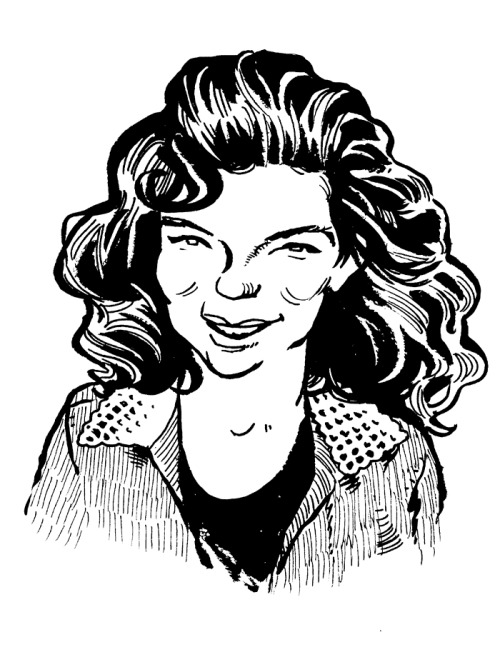Jessica.
Creek Cafe. San Francisco.
This isn’t Jessica Sele’s first accolade for being funny. She couldn’t enter a competition or school rally without leaving with some award or praise, a People’s Choice award for singing “Don’t Rain on My Parade” standing out among the lauds. There were two choices for her high school yearbook superlative: Most Likely to Be A Stand-Up Comedian and Most Likely to Be A Funny Mom. Jessica chose the former. “No offense to funny moms.”
Jessica is a showtune-loving belter known to launch into “Hellfire” from the Hunchback of Notre Dame—once performed, against her family’s consent, as a child during Thanksgiving dinner—or dropping a few bars in a casual cafe conversation. She’s always felt destined for the bright lights of Broadway (still working on it). Still, the world’s a stage, her stage, and she bounds the boards between interludes of recognized realness, albeit, with less melodies.
“I think that from a young age I felt like I was turning something weird into something positive…[Comedy] is a positive way to express negative emotions.”
Jessica is a comedian. She’s a friend to the plight of animals and has dated the fastest drummer in Oakland. She moved to the Bay in 2011—”It was a good place to be 23”—after graduating from Western Washington University, where she co-founded SUCK, the Stand-Up Comedy Klub. Over the years that I’ve witnessed the jocular Jessica, she’s grown, changed by experience, but has retained lightning-fast response coupled with wondrous weirdness. Many anecdotes are retorts against life’s microagressions, others are parables clamoring against expected mortification. “My ideal performance message is there is dignity in shame and pain…and, also, that the world is ending”.
Comics are often characterized as obtuse, willfully insensitive. “You’re being too sensitive”, “Too PC”. Sensitivity is code for “soft”, which is code for “censored”, which is code for “lying”. A lot of comics distance themselves from it, Jessica Sele embraces it. For Sele, sensitivity isn’t trivial. The same instinct that cautions against external preconceptions and internal pressure also allows for brilliant onstage presence. If there’s something afoot, Sele will suss it out, incorporate the tension and strive to salvage the unease, all in humorous candor, or with silly voices, or in poignant asides. Riffs ripple like capillary waves, stacking in awareness, 4th-wall-breaking while mugging in a mirror, commentary on commentary, pure farm-to-table funny.
And then, across the table, a change. Jokes lower to a simmer. A serious thoughtfulness, interlude of recognized realness. Jessica takes her time between answer and question, collecting thoughts in the distance. She may be complex, contrasted and conflicted, but she won’t be confused, she won’t be misunderstood.
“Definitely I’m a little more focused on personal issues because I’m in my brain all of the time and it’s a crazy experience and I know a lot about it [looks at phone]—recording is weird. But to be so personal and honest about the crazy things that are going on in my brain I think is what people are responding to sometimes. I think a lot of people have a lot of intense stuff in their brain that doesn’t come out.”
“Why do you think people hold that shit in?” I inquire.
“People don’t want to seem weird or crazy and I just want to remind them that they are. ‘Cause it’s more fun that way. And I think it’s more humanizing,” Jessica responds.
Sele is capable of speaking so real, so raw, so human, that the room expresses a collective, lizard-brained bellow, an aural explosion to relieve the debilitating truth. Laughter in discomfort lacks comfort. There’s ambivalence in the irreverence. It’s not always obvious. Everything appears fine during the comedian’s references Space Jam, or ebellishes tales of DJing at an lesbian orgy, performer and audiences chuckling synergistically. But, sometimes, Jessica’s face will twist in discomfort, or she’ll voice pain, that the insecurities and traumas she’s expressing are triggered and aching. Sure, all parties are consenting adults, Jessica chooses to joke her way, the audience responds in kind, but I feel complicit in tragedy. It’s a disconcerting, sad subtext that, while Sele is going through such a heaviness, I feel lighter, less burdened (at least for a little while). It’s a remarkable, beautiful emotional ecosystem.
“Recently at the Mission Position [a showcase Jessica Sele co-produces every Thursday at Lost Weekend], an older guy just lost his cat and he said that I made him feel better. That’s something… that’s not nothing… I’m not nothing!”
Jessica Sele is not nothing. She is something else.
words by oj patterson
illustration by ben walker
